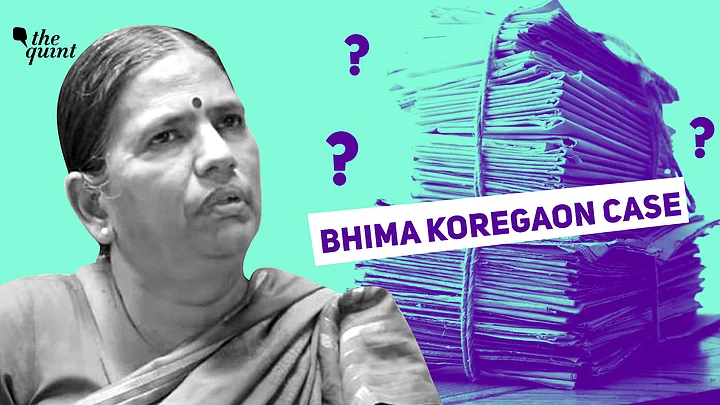(This interview of originally published on 25 January 2022 and is being republished from The Quint's archives in light of the bail granted to Vernon Gonsalves and Arun Ferreira, both accused in the Bhima Koregaon case.)
Sudha Bharadwaj, lawyer and activist, was granted bail in December 2021 after spending three years in Mumbai's Byculla prison. One of the 16 accused people in what is being talked about as the Bhima Koregaon case, Bharadwaj is still awaiting a trial.
In this exclusive interview, she talks about freedom, justice, patriotism, constitution and a lot more.
Below is an excerpt from the interview:
You are out of jail after three years. What does it feel like?
Well, there are no more policemen around. You are not being told when to wake up, when to eat breakfast, and other things. Yes, freedom is precious. But it is also partial. My bail conditions require me to stay in Mumbai. I'm not allowed to go to Chhattisgarh. So, it feels like being in exile in own country.
Have these three years in prison dented your faith in India's justice system?
As a trade unionist and a people's lawyer, I have always worked with the 'system' for justice. One has no choice but to believe in it. You go to 'system' to seek justice.
The poor and the marginalised, people with no 'access' have no access to justice as well. How to make justice accessible to all?
I saw it upfront in Byculla jail. For two years, owing to COVID-19, nobody went to court. If the family doesn't follow up from outside, the prisoner is dependent on the legal aid. Now, legal aid lawyers could not afford cab fare and public transport was not available, so no meeting with clients happened. There is no budget to meet clients, obtain documents, collect evidence. Therefore, legal aid lawyers end up doing 'kaamchalau' work. But this can lead to imprisonment or sentencing.
I wrote letters from the jail and requested everyone concerned to mandate legal aid lawyers meeting the client after obtaining vaqalatnama and the chargesheet. Many prisoners are illiterate and even if they are literate, they don't understand chargesheet. We must end one-way communication. Legal aid lawyers need to be more responsible.
Is Sudha Bharadwaj a better lawyer after this prison experience?
Lawyers, because they know the law, tend to rely on papers. But, experience shows that often a prisoner's story is completely at odds with the chargesheet. It is because facts are distorted, suppressed, slectively recorded. A crime created out of non-crime and vice versa. It is very important to listen carefully to the clients. Nobody knows the facts better than them.
Is Sudha Bharadwaj a real patriot?
Yes.
Loving the country doesn't mean loving its territory or its money. It means loving the people of the country, working for the vulnerable. I think I have done the most that I could for my country by working for the most marginalised sections of the society.
What are your plans for the future?
I'm going to be in Mumbai for the foreseeable future. I need to make Mumbai home, it is an alien city for me. It is also an expensive city. I can't wait to put on my black coat again and help some prisoners that I met in Byculla. I would also like to work for trade unions.
I've never practised law to make money. I'll also have to find a way to earn. These are difficult times ahead.
What are your three suggestions to improve India's justice system?
My first suggestion is to overhaul the legal aid system. It is not for webinars, talks, garlanding, awareness drives etc. Prisoners have awareness, they have nobody to argue for them.
Only Rs 3000-5000 given are to a legal aid lawyer for the entire trial that may take years. Legal aid lawyers must be paid well.
NLU alumni join corporates because money is better there and it's impossible to make a decent living out of litigating for people who cannot pay you. Attract better talent for those who need legal aid the most.
My second suggestion is that prisoners' issues need to be communicated to the court. Lawyers and judges must stay informed so remedial steps can be taken whenever required. After all, a prisoner is in the custody of court. The court should take its responsibility more seriously.
My third suggestion is to improve videoconferencing systems since we are going to be dependent on it for a while now.
Why did you decline the offer to be a custodian of constituttion by becoming a High Court judge?
It was a kind offer by the then chief justice. It may not have materialised as many other judges had reservations. I felt honoured and was thankful for being considered. But I told the Chief Justice that good people were required on every side. They are required on the bench, they are needed in the bar.
Who are the most discriminated against among the marginalised when it comes to the justice system?
It's a difficult question. The judiciary recognises some discrimination. Women, Dalits, adivasis, workers are all deeply discriminated against, but they have remedies available in the constitution.
The bigger problem is for those who are labelled as terrorists. There is nothing to protect them. The day you start thinking like "All adivasis are terrorists", "All Kashmiris are terrorists", "All muslims are terrorists", then what do you do? Such discriminations are not spoken about in the Constitution. Our constitution never imagined a situation that we'll be doing something like this.
(At The Quint, we question everything. Play an active role in shaping our journalism by becoming a member today.)


